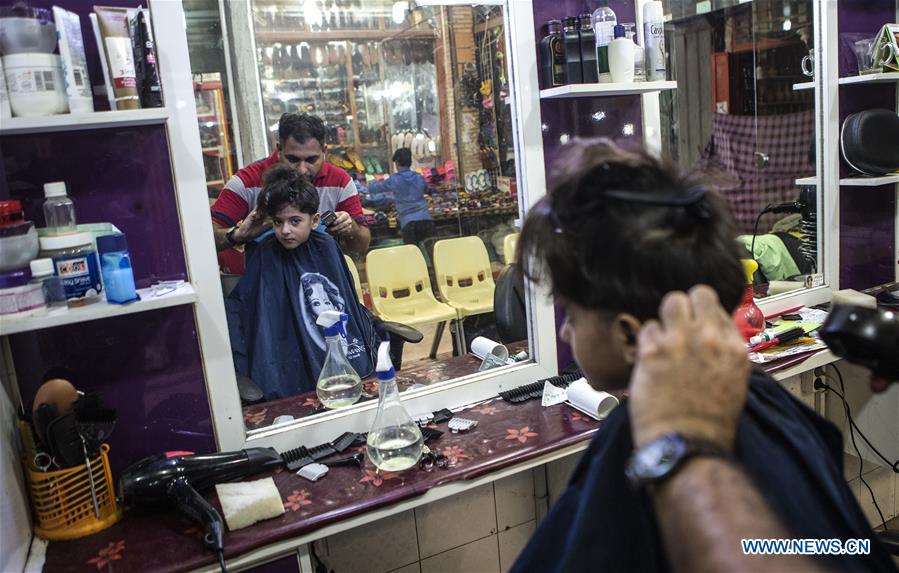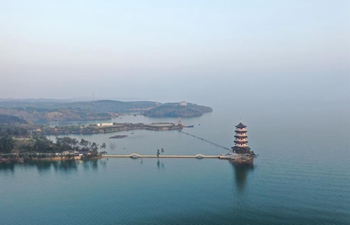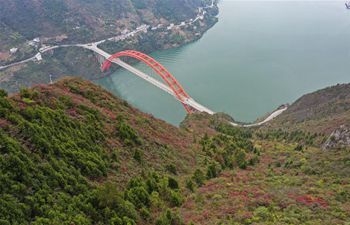
A boy gets hair cut at a barber shop in an old bazaar in port city of Bandar Abbas, Iran, Nov. 28, 2019. One year after the United States fully re-imposed its maximum sanctions against Iran, the economy of the Islamic republic has experienced impact but survives. (Photo by Ahmad Halabisaz/Xinhua)
by Mu Dong, Hassan Rouhvand
TEHRAN, Nov. 27 (Xinhua) -- One year since the United States fully re-imposed its maximum sanctions against Iran, its economy has experienced impact but survives.
When the United States quit the Iran nuclear deal, officially known as Joint Comprehensive Plan of Action (JCPOA), in May 2018, and then re-imposed nuclear sanctions in August and November 2018, there was an expectation among U.S. decision-makers that the Iranian economy would collapse within months.
But while the sanctions have indeed severely undermined the Iranian economy, there are no signs of its collapse.
In Washington's maximum pressure campaign against Iran, the U.S. has not only re-imposed all sanctions waived under the JCPOA, but has also added numerous further sanctions.
The sanctions resulted in decline in oil and gas export revenues, which caused direct and indirect negative consequences for Iranian government finances.
When the sanctions were started, the government faced big budget deficit. This year, Iran has resorted to remedies to reduce the fiscal vulnerabilities and balance the budget. A number of reforms have been initiated, including a reduction of the dependence on oil revenues, an increase in tax revenues and a revamp of subsidies.
As the reforms require a few years to improve the government's financial position, short-term remedies have been applied that will help the country survive the sanctions.
Truly, it's too early to measure the success of all the moves. But Iran's strategy in response to the U.S. maximum pressure has been to offer proactive resistance. The initial shocks have been overcome and economic indicators show a positive outlook.
"Iran's economy has survived the U.S. sanctions and has had a stabilizing trend following a period of instability," said Saeed Laylaz, an Iranian analyst of political economy.
After the Western and international sanctions against Iran were lifted in 2016 by implementing the JCPOA, Iran experienced an economic growth over 10 percent, according to the International Monetary Fund (IMF).
However, the trend was sharply declined as U.S. President Donald Trump pulled the United States out of the deal, and his administration subsequently imposed broad unilateral sanctions against Tehran targeting nearly most vital sectors of Iran's economy, the expert pointed out.
The U.S. move alongside Europe's sluggishness in facilitating Iran's banking transactions and its oil exports prompted Iran to renege step by step from its nuclear commitments.
Besides the recent move to begin enrichment activities in Fordow nuclear facilities, Iran has, since May, stated to build stockpiles of nuclear fuel and enrich low-grade uranium to a higher level of purity.
It also started up advanced centrifuges to gradually boost the country's stockpile of enriched uranium and research activities, all of which had been restricted by the nuclear deal.
Although Iran has refined uranium to a fissile purity of 4.5 percent, far below the bomb-grade threshold of 90 percent, and stressed that its nuclear program is aimed at peaceful purposes, Iran's decision to reduce nuclear commitments has raised concerns of Europe as well.
On Nov. 12, Europe threatened that they may trigger a mechanism that could re-impose international and UN sanctions on Iran in case the country does not honor its obligations under the deal.
U.S. sanctions, coupled with levels of corruption and the Iranian government's mismanagement of economy, have played a key role in the problems that has hit Iran's economy.
Almost major sectors of the economy have experienced the burden of a recession.
According to the IMF's World Economic Outlook report in October, the impact of sanctions will contract Iran's economy 9.5 percent in the current year.
A similar report was made by the World Bank which set the contraction of the Iranian economy at 8.7 percent in 2019.
Negative projections for Iran's economy along with the recent rise in energy indicators unleashed a wave of violent protests and criticism of President Hassan Rouhani inside the country.
On Nov. 15, the Iranian government started rationing subsidized gasoline and increased its prices.
According to a statement published by National Iranian Oil Products Distribution Company, the price for a liter of subsidized gasoline was increased to 15,000 rials, or nearly 35 cents at the official rate of 42,000 rials per dollar, from the earlier 10,000 rials.
The statement said that the monthly ration for each passenger car is set at 60 liters. Additional purchases would cost 30,000 rials per liter.
Following the hike of the prices, protests and violence erupted in a number of Iranian cities.
At least 100 banks and dozens of governmental buildings were set ablaze during the recent protests over gas price hike. Local reports said more than 1,000 "rioters" have been detained.
"We have passed through the crisis," Rouhani said, promising that the economy will grow slightly in the year to come.
Despite the IMF and the World Bank reports on Iran's economy and Rouhani's critics, Laylaz believes that "some degrees of stability in the country's economy gave the government the confidence that it could survive the economic and social impact of reducing (fuel) subsidies."
Laylaz argued that Rouhani did not increase the oil price immediately after U.S. sanctions last year as the impact of pressures could have triggered even worse protests.
"The stability of the economy (over the past year) helped the government finally dare to increase oil prices," he added.















